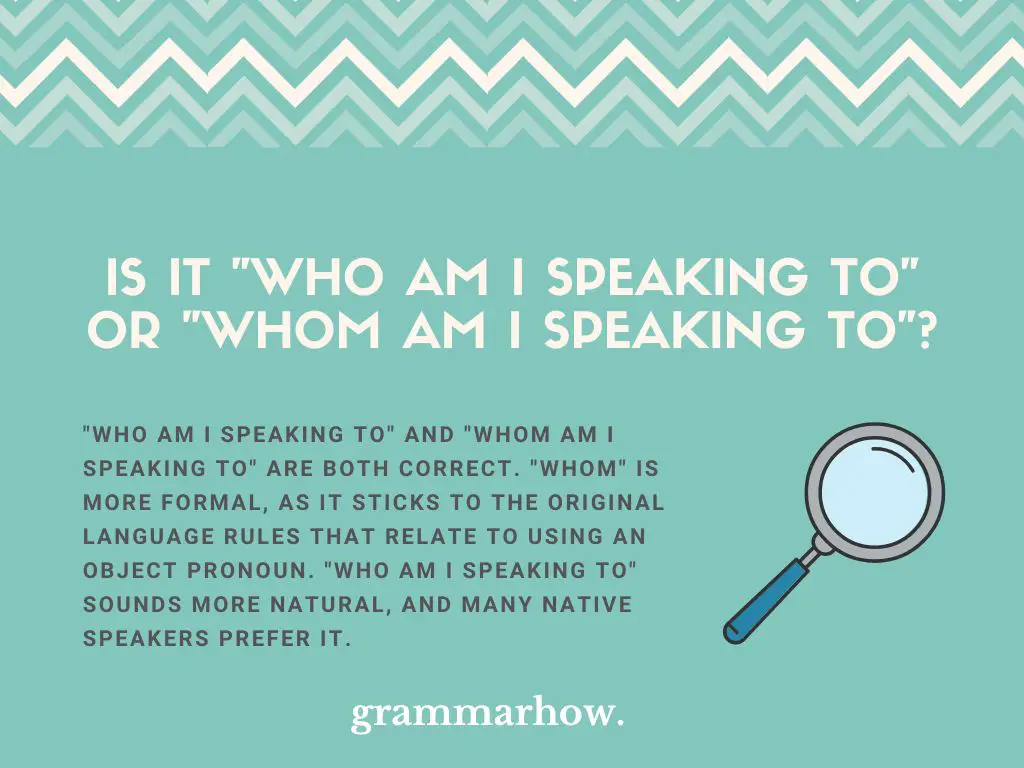If you want to find out who you’re speaking with, you might want to use “who am I speaking to.” Sure, it’s a simple enough question, but there are rules that you have to understand when using “who” and “whom.” This article will explain all of them.
Is It “Who Am I Speaking To” or “Whom Am I Speaking To”?
“Who am I speaking to” and “whom am I speaking to” are both correct. “Whom” is more formal, as it sticks to the original language rules that relate to using an object pronoun. “Who am I speaking to” sounds more natural, and many native speakers prefer it.

While “who am I speaking to” was originally the more informal phrase, it has started to become the best phrase regardless of sentence tone. Many native speakers think “whom” sounds too old-fashioned and pompous, so they avoid using it.
If you were to use “whom am I speaking to” today, most people would think you’ve made a grammatical error. Even though it’s the correct way of phrasing the question, it’s not something that many people use themselves.
Many native speakers don’t even know about the differences between “who” (the subject) and “whom” (the object). Because of this, “who” has started to transform into an object in some cases, where it can overtake “whom” in certain sentences.
The phrases are interchangeable at the end of the day. If you’re going to use one form, make sure you stick to it throughout your writing.
According to Google Ngram Viewer, “who am I speaking to” is the more popular choice of the two. There’s quite a substantial difference in their usage as well, showing that “whom” was never a favorable choice for this sentence structure, despite it being the correct one.

Who Am I Speaking To
“Who am I speaking to” works well when you want to ask who you are in contact with. You can use “who” as an object in this case (rather than the subject that “who” usually represents). It’s a more common way of saying it.
Native speakers will always value “who” over “whom” when speaking like this. Most people like to come across as friendly and polite, and words like “whom” have a habit of making you seem a bit too formal or false.
- Can I ask, who am I speaking to? I don’t think I’ve ever heard your voice before.
- Who am I speaking to, though? Are you going to be able to help me get through this or not?
- And who am I speaking to? I’d like to take your name, so I can report you to your manager.
- Oh, but who am I speaking to? I’m sure you haven’t mentioned your name yet.
Whom Am I Speaking To
“Whom am I speaking to” is grammatically correct. It works best formally, but even in those situations, most native speakers prefer to hear “who am I speaking to.” “Whom” is the correct object form, which is why it makes more sense if you want to be officially correct.
- Whom am I speaking to? I’m sure there’s more that you need to say on this matter.
- Whom am I speaking to again? I can’t remember your name, but I’ve had a really pleasant experience.
- And whom am I speaking to? You seem to have gone awfully quiet down the line.
- Whom am I speaking to? Are you able to help me handle these issues?
Is It “Who Am I Speaking To” Or “To Whom Am I Speaking”
“Who am I speaking to” has already proved itself to be a popular choice. We can also use “to whom am I speaking” if we want to reword it slightly. In this case, “whom” is better than “who” because it comes directly after the preposition “to” in the sentence.
According to Google Ngram Viewer, both phrases are very popular. “Who am I speaking to” is still the most popular, but there isn’t much difference in it when “to whom” is used.

Final Thoughts
“Whom am I speaking to” and “who am I speaking to” are both correct. However, “whom” in this phrase is seen as incredibly old-fashioned and pompous. Most people avoid using it because they find it jarring. It’s always best to stick to “who” in these situations.
You may also like:
“Who Are You Waiting For” or “Whom Are You Waiting For”?
Is It “Who Do You Live With” or “Whom Do You Live With”?
“For Who” or “For Whom”? Correct Version (With Examples)

Martin holds a Master’s degree in Finance and International Business. He has six years of experience in professional communication with clients, executives, and colleagues. Furthermore, he has teaching experience from Aarhus University. Martin has been featured as an expert in communication and teaching on Forbes and Shopify. Read more about Martin here.
